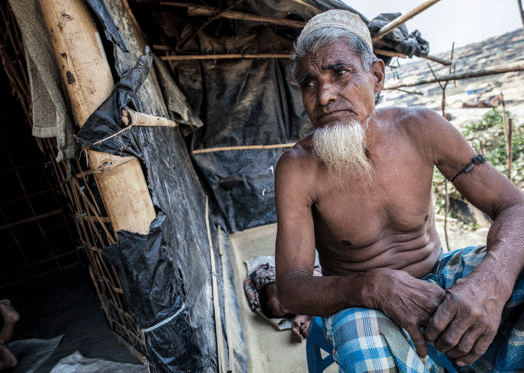hell from the sky

On the edge of a barren sun-baked hill, Amina is hastily filling sand bags while her husband digs trenches in front of their bamboo and plastic shelter. She stops and looks up at the gathering clouds. She knows what’s going to happen when the rains come. Everybody knows. The monsoon season is approaching and will wreak a devastating blow to the world’s largest refugee camp, an hour drive south of the bangladeshi fishing town of Cox’s Bazar. Almost one million muslim Rohingyas who fled the bloody ethnic cleansing in Myanmar and hundreds of UN agencies and Ngos are now bracing for hell.
The “mega camp” is a logistic nightmare. There are no access roads, except one that the army is now reinforcing; the soil is sandy and all the trees, even the roots, of the once lush tropical forest have been cut for firewood; overcrowded shelters are closely packed on the hills’ steep slopes; sewage ditches are clogged and poorly designed latrines have already contaminated the aquifer. Relocation of at least 220,000 refugees on safer grounds inside the camp is far behind schedule. “We’re running out of time” says a UN worker. “And if a cyclone strikes, well, there’s not much we can do. We don’t have an evacuation plan for these people”.
In the worst case scenario, with winds up to 120-150 mph, the only facility most likely to stand will be the recently built MSF’s steel and concrete hospital: shelters, schools, health posts, mosques, warehouses, aid distribution hubs will be smashed and blown away. Cyclons follow a random course, so with some luck they could spare the refugees. But the inescapable torrential monsoon rains are by no means a less daunting challenge: a sea of mud will engulf the whole mega camp.
Low grounds will be flooded, scores of people will presumably die and be injured by ruinous landslides, latrines will overflow, drinking water will be in shortage, health centers will be closed or unable to function and emergency teams will have little or no access to the most affected areas.
Even graveyards are seen as a threat. Rohingyas are burying their dead in shallow tombs that could be easily washed downhill: floating decomposing bodies will further enhance the risk of epidemics and diseases.
Another chapter of a tragic destiny is unfolding for the unwanted people of Myanmar. They have lost everything: goods, jobs, houses, lives. They have no citizenship and no place to go. “I know I will die here” eighty years old Ali Ahmed says. “If I ever get back to my village nobody will be allowed to pray for me. Here, at least, my children will visit my grave”.





